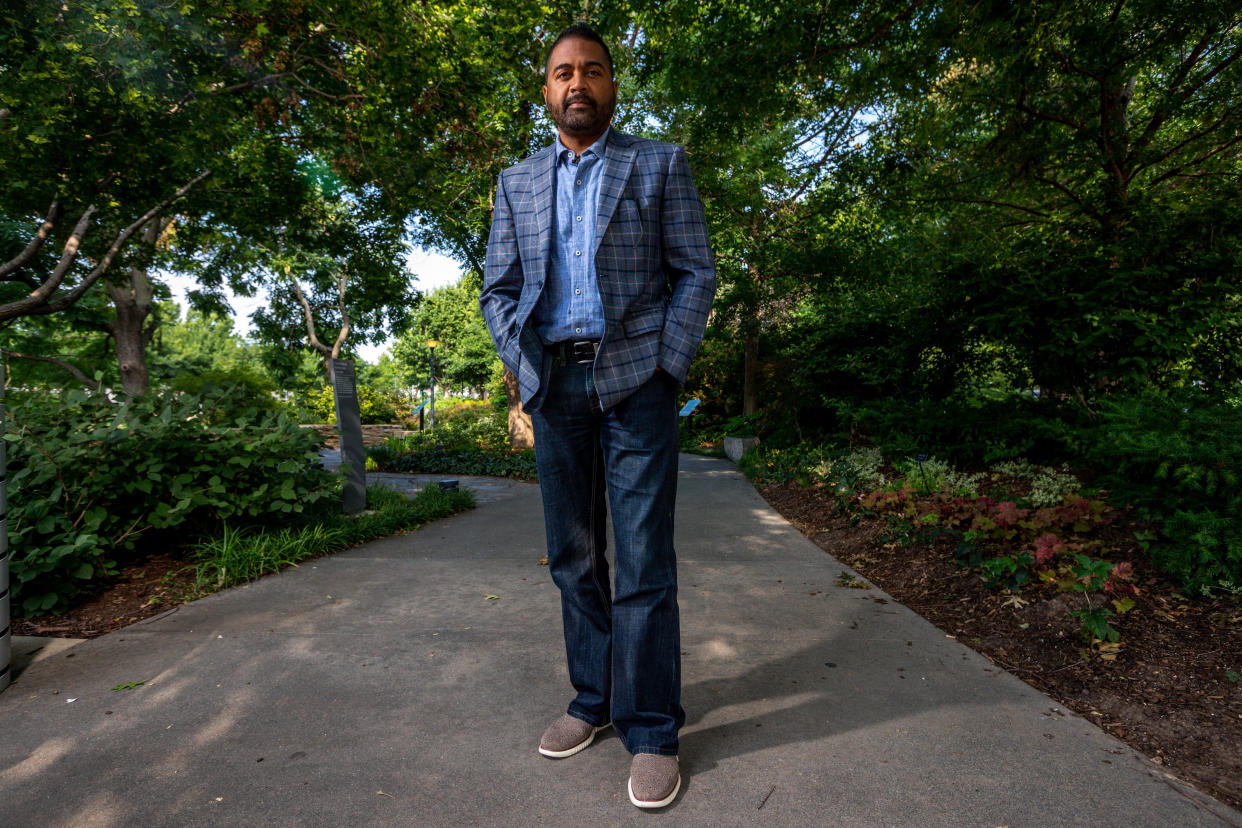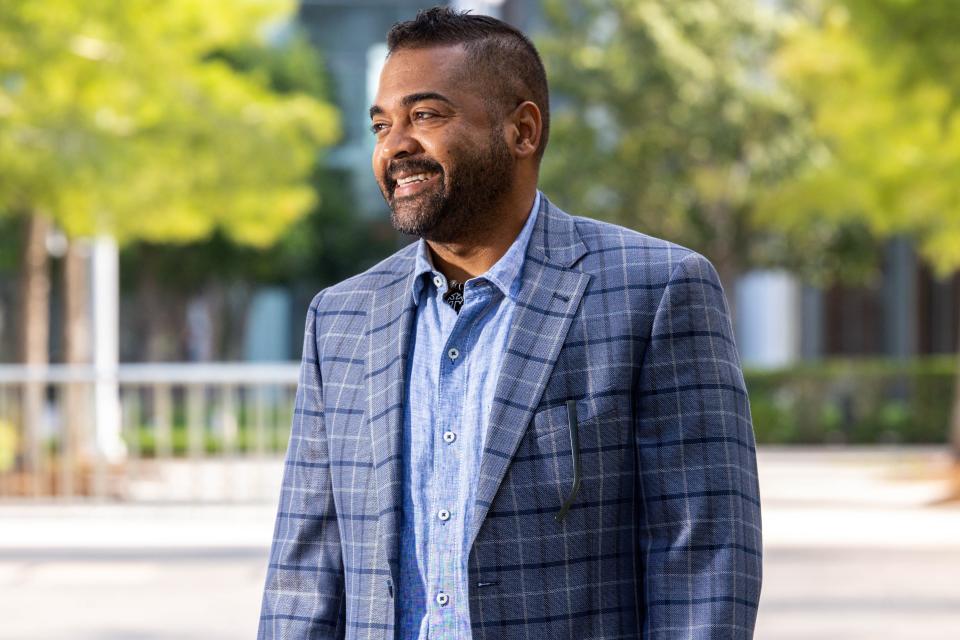How can Oklahoma confront racism in its past and present? 'It's going to take the young.'

There was plenty of time to reflect during the three-hour drive from Tulsa to a McCurtain County city reeling from an infamous racist incident.
Phil Armstrong, former project manager for the 1921 Tulsa Race Massacre Centennial Commission, was in a situation once again where he would be challenged with helping people navigate and confront bigotry. As the new leader of the Oklahoma Center for Community and Justice, he headed to Idabel to recruit youths for the center's Anytown Leadership Institute.
He felt the young people might benefit from the nonprofit's weeklong program, particularly in the wake of the McCurtain Gazette's release of an audio recording that captured McCurtain County officials talking about killing journalists and lynching Black people.
More: Oklahoma investigation into McCurtain County sheriff uncovers no crime, AG says
Anytown was created 29 years ago to teach young people skills to help them confront and challenge stereotypes, prejudice and bias, while also helping them discover effective ways to become allies for one another. For Armstrong, who is Black, the recruitment visit seemed to connect his past and his present. He'd spent several years with the race massacre centennial commission, helping to tell the story of a racism-fueled tragedy that largely remained a secret for decades.
Armstrong said he realized that many of the themes that surfaced during his time with the race massacre commission were also interwoven into his new post — the importance of educating people about bigotry, prejudice and bias, and confronting it when it's exposed. Thus, he and his staff found themselves on a mission to persuade Idabel youths and their parents about the benefits of Anytown, set for July 16-22 at Oklahoma State University in Stillwater.
They succeeded. Almost a dozen Idabel High School students are set to attend this year's institute free of charge.
Looking back on his work surrounding the race massacre commission and his involvement with the Greenwood Cultural Center, Armstrong said helping people overcome barriers to build a better future seems to be part of his destiny.
"The mantle has been placed on me," Armstrong said.
"We've got to live in community."
'It's going to take the young'
A longtime Idabel High School English and special education teacher was pleasantly surprised to hear that Oklahoma Center for Community and Justice was visiting her city.
Sharon Hill Wooten said Idabel youths were regular participants of Anytown for years and her daughter, Kristen, enjoyed attending the leadership sessions one summer. Wooten, 62, said she was sad when the center's outreach to the area seemed to dry up. She said after a hiatus of about 10 years, she thought Anytown had "faded away" and wasn't even offered anymore.
Then a school counselor told Wooten about Armstrong's plan to visit Idabel to recruit youths.
"I was just elated to make contact with him and excited about the prospect for students to attend Anytown," she said. "My hope for them is that they will benefit from Anytown and change the climate of our county. It's going to take the young making a positive difference for our county."
Wooten, who is Black, retired from teaching in May, but before she did, she made sure the Anytown-bound youths, along with their parents, knew that they were in for a treat. For many years, she drove Idabel Anytown participants to the location where they were to meet up with Anytown advisors who would transport the youths to the program site. She was excited to hear that the Oklahoma Center for Community and Justice and OSU would be providing Anytown participants with free transportation and chaperones directly from Idabel to the Stillwater college campus.
"We've got to make some changes," she said of her community.
"It's not a short-term fix — we're looking for some long-term solutions for our kids."
Without it, the educator said she's convinced many of them will leave the area at the first chance they get. She returned after graduating from college.
"I came back because I sure love my small-town Idabel," Wooten said. "We want them to come back to our community."

Meant to be
The Oklahoma Center for Community and Justice is based in Tulsa, but the nonprofit has an office in Oklahoma City, as well.
Armstrong said he had been enjoying his role as leader of the Greenwood Rising Black Wall St. History Center, which was one of the lasting achievements of the 1921 Tulsa Race Massacre Centennial Commission. He felt the center needed a museum curator to lead it into the future, and running a history center wasn't part of his expertise.
"My focus was on community, and I wanted to continue that work," he said.
When he was exploring his options after stepping away from the history center, numerous people implored him not to leave Tulsa. Armstrong, an Ohio native, said he was happy to oblige because he thought his journey to Oklahoma seemed meant to be.
More: Jesse Jackson says the McCurtain County sheriff should resign. No one is certain he will.
He said he was introduced to some of the state's history when he was a sophomore at Central State University in Wilberforce, Ohio, a historically Black college. One of his professors spent an entire semester discussing "the amazing things" that happened in Indian Territory, particularly with the emergence of the all-Black towns and facts about Indigenous tribes. In 1997, his best friend who was from Tulsa asked him to come to Tulsa, and he became a Greenwood Cultural Center board member and eventually board chairman.
Armstrong said he relished his role as a Greenwood leader, and later with the race massacre centennial commission. He's especially proud of Greenwood Rising because it tells the story of Greenwood/Black Wall Street before the race massacre, during the massacre and the resiliency of Greenwood residents who stayed and rebuilt.
He knew that an important part of that conversation was to ask: "How do we talk bout this and where do we go from here." The Oklahoma Center for Community and Justice is helping to answer that question, particularly the latter part.
Meanwhile, Armstrong pointed out that the nonprofit has other worthy programs besides Anytown. The center recently offered a Youth Leadership Forum for Community Transformation, designed to immerse youths in discussions about the legacy of the Oklahoma City Civil Rights Movement and ethnic diversity in America. Armstrong said the forum was initially launched in Tulsa through a partnership between the center and Greenwood Rising. It was expanded to the Oklahoma City area due to United Way of Central Oklahoma Wayfinder Grant contributions. The center also offers DEI workshops and development, along with interfaith activities such as an interfaith youth tour and a Jewish/Christian Dialogue Group.
Currently, planning for the Anytown Leadership Institute has taken center stage. With the successful Idabel recruitment mission behind them, Armstrong said he and his staff are exploring the idea of visiting more small cities and towns across the state to take their message beyond Oklahoma City and Tulsa.
He said he's hopeful for the year's Anytown and beyond that, all of the possibilities ahead for the nonprofit he now leads.
"I could not have picked a better place to land," he said.
To learn more
For more information about the Oklahoma Center for Community and Justice, go to https://www.occjok.org/.
This article originally appeared on Oklahoman: Former Tulsa Race Massacre Centennial Commission leader relishes new role

